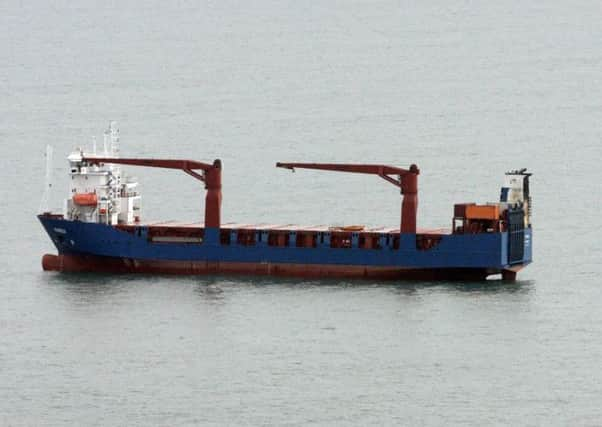Inquiry call after nuclear ship blaze in North Sea


The vessel was carrying a cargo of radioactive concrete from Dounreay in Caithness to Antwerp in Belgium when a fire broke out in one of its two funnels on Tuesday night.
Crew aboard the Danish-registered Parida had to shut down the engines to bring the flames under control, leaving it drifting without power in stormy seas 20 miles south-east of Wick. The blaze was eventually extinguished, but 52 workers were airlifted from the Beatrice oil platform as a precaution.
Advertisement
Hide AdAdvertisement
Hide AdThe stricken ship came within seven miles of the oil field, which lies 15 miles off the coast in the Moray Firth.
The Parida has now been towed to the Cromarty Firth, where it remains anchored about a mile offshore until it can safely be moved.
Scotland’s environment minster Richard Lochhead is seeking assurances from Westminster that a suitable towing vessel will accompany the Parida when it is considered fit to leave Scottish waters.
“I will also be asking for an investigation to examine what caused this incident, and why we have a situation that vessels that are carrying nuclear waste in our waters are waiting for weather windows at this time of year – especially given the impact the weather could have on any rescue operation,” he said.
“We have to ensure we are taking absolutely every single precaution that comes with the transportation of nuclear waste.”
Caithness, Sutherland and Ross MSP Rob Gibson said the emergency highlighted a number of issues. He said: “This raises questions like, should materials like this be in ships that set sail from Scrabtser in what is known to be extreme weather?
“Should we be transporting these materials by sea? This has happened and we have been fortunate the drifting ship could be rescued. It is essential these shipments are escorted out of Scottish waters – when fit to sail.”
Advertisement
Hide AdAdvertisement
Hide AdThe incident has also sparked calls to halt future plans to carry more radioactive materials through Scottish waters.
Campaigners from Highlands Against Nuclear Transport (HANT) want to stop the impending trial of shipping waste from Dounreay to Sellafield in Cumbria. The trials are part of efforts to find an alternative to the controversial practice of sending spent fuels from Dounreay, which is being decommissioned at a cost of £1.6 billion, by rail for reprocessing at Sellafield.
But critics are warning against the risks of navigating the rough seas around Cape Wrath and the Minch, especially since a coastguard rescue tug was withdrawn from Stornoway.
HANT chairman Tor Justad said: “This latest incident highlights the need to stop these shipments. The waste should be stored at Dounreay and should not be moved by sea or rail.”
He added: “I am not reassured by the various assurances over safety. This breakdown illustrates the dangers.”
The Nuclear Free Local Authorities (NFLA) and marine issues local government group KIMO International have also raised concerns, while Friends of the Earth said rail transportation is a better option than navigating the stormy waters off the north and west coast.
Councillor Mark Hackett, NFLA chair, said: “I am alarmed with the prospect that the owners of the Dounreay facility are contemplating transporting highly radioactive materials by sea to Sellafield.”
But Dounreay chiefs defended the pilot, which could offer two potential routes for disposing of waste that cannot be dealt with at the site near Thurso. A spokeswoman for the base said members of the Dounreay Stakeholder Group were informed about the trials, which will be carried out before the end of the year.
In all, around 200 shipments are now needed to empty Dounreay of 100 tonnes of nuclear material. So far 19 out of 90 planned rail transits – costing £60 million – have taken place.